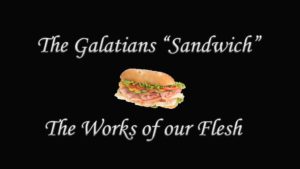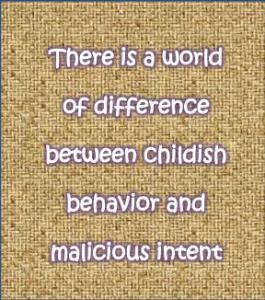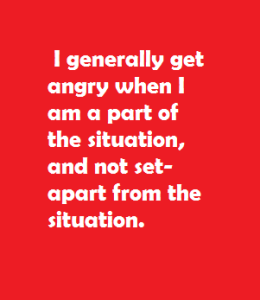The Galatians 5:19-21 “Sandwich” – The Works of OUR Flesh
 I hope you weren’t expecting to feel good about yourself and your “whole Bible” “Torah observant” lifestyle today – but as I didn’t spare myself, you can’t complain much. I call this section of Scripture the sandwich where we focus on the bread while ignoring the meat, despite the fact that, in practice, we reject the bread and gobble down the meat – from Galations 5:19-21
I hope you weren’t expecting to feel good about yourself and your “whole Bible” “Torah observant” lifestyle today – but as I didn’t spare myself, you can’t complain much. I call this section of Scripture the sandwich where we focus on the bread while ignoring the meat, despite the fact that, in practice, we reject the bread and gobble down the meat – from Galations 5:19-21
“Now the works of the flesh are evident: sexual immorality, impurity, sensuality, idolatry, sorcery, (yeah. that’s right – death to the perverts, idolaters and drug addicts, ha! those rebellious losers!)
enmity, strife, jealousy, fits of anger, rivalries, dissensions, divisions, envy (um… my spidey senses are tingling, must be the enemy trying to steal my peace, time to move on)
drunkenness, orgies, and things like these. (yeah, drunken orgy-goers!)
I warn you, as I warned you before, that those who do such things will not inherit the kingdom of God.” (that’s right – those sex-crazed crazed, drunken idol worshipers aren’t inheriting the Kingdom!)
So we have here what I call the Galatians 5 sandwich, or “the other guy” sandwich. We sure do enjoy calling out the first five and the last two of these – and why? Well, because they are grotesquely obvious sins that only blatant sinners commit, at least in the open, right? No challenge there – and no one feels bad about themselves (not unless they start looking at other, more socially acceptable addictions or questioning themselves about whether watching sex scenes in movies counts as sexual immorality). But we aren’t here to talk about those. We’re here to talk about the works of the flesh that people pass off as righteous zeal or don’t give much thought to at all. Zeal – remember that word, as it will be important later.
Enmity – the state or feeling of being actively opposed or hostile to someone or something. For example: “enmity between Protestants and Catholics”
Whoa there Nelly! If there is one thing I see in too many of the people around me, it is open hostility to people and/or things. I see people who hate Catholics so much that they would rather die horrible deaths than give Catholics credit for the good works they do – and those poor fools who do dare to give Catholics credit get called papists or worse. I actually did get called a Jesuit spy last week for something silly. I see people hostile beyond logic towards Jews and Protestants as well – to the point where everything and anything about them has to be mindlessly attacked and discredited – even if good, or at worst, harmless. That’s enmity, living your life in hostility – it is not a Kingdom principle, and more than that, it compromises our ability to love and grow good fruit. And yes, I am sure that, despite the Scriptural warning, the reason why you are personally doing it is entirely justified. (That, boys and girls, was sarcasm. In fact, my eyes rolled so far out of my head when I said it that I had to call my kids to go look for them)
Strife – angry or bitter disagreement over fundamental issues; conflict. For example: “strife within the community”
Disagreement over fundamental issues is not the problem here, you see, but when it becomes angry and bitter – oh yes, big problem. This is when we see the insults and cheap shots brought to the table instead of just sticking respectfully and honorably to the facts at hand. Of course, we don’t limit our anger and bitterness to the fundamental issues, we get angry over the tiny ones as well, our pet doctrines. Of course, our pet doctrines are never small – in fact, there are no small issues in Scripture, and failure to recognize that means that someone isn’t really believing the entire Bible. Right? Right? Maybe not. Strife is founded on and rooted in control issues and fear, which are both contrary to the fruit of peace and self-control. There are things to stand our ground on, but not with bitterness; stands to take in passion, but hateful anger? Very few issues actually warrant anger, and when that anger morphs into hatred among believers? Except for our issues, because they are the most important, and we always have the discernment and maturity to hate wisely, don’t we? After all, our track record has been spotless so far.
Jealousy – I am going to risk making you really irritated and point out that the word translated as jealousy is zelos – yeah, it looks exactly like the word zealous for a reason. In fact, half the time this is translated, it is rendered “zealous.” Zeal is probably one of the most self-deceiving forces on earth and there is a big difference between the Jews coming to Yeshua/Jesus in Acts 21:20, who were zealous for the law that they had grown up with and knew inside and out, and when James and Paul combined that same exact word with selfish ambition (James 3.14) and strife (I Col 3:3). Problem with zeal is that I never met a single person who didn’t think their brand of zeal was the righteous kind – you know, like Paul when he was arresting and persecuting believers.
Jealousy, the other way to translate this word, is an ugly thing, it is a blinding thing. Twice in my time as a believer, I have had jealous wives after me – the first time because a choir director became strangely fascinated with me (I know, I mean like look at me – lol, what gives? Who knew that albino oompa loompas were so alluring?) and the second because – honestly, that was nuts because, to me, the guy was just needy and constantly whining and I don’t think that any woman (other than herself) would be attracted to that. I certainly never saw him as anything other than annoying. But jealousy is not a logical thing, it doesn’t look at the evidence, it is suspicion and paranoia driven. It happens in personal relationships, yes, and also in any situation where people feel threatened.
Fits of anger – this is the one that applies to me more than any other on the list, boy howdy. Just ask my kids. I am one of those people who just BAM! EXPLOSION. As much as I would like to wage a sarcastic defense of this one, it strikes WAY to close to home for me to even joke about. It isn’t funny because I hurt people with it. None of the works of the flesh are funny, and this one gets unleashed against kids, and innocent bystanders on social media way too often, when we launch into knee-jerk accusations and insults over very little, when even a lot should never move us into this area.
Rivalries – competition for the same objective or for superiority in the same field. For example: “commercial rivalry”
This should never even begin to happen in the faith world, but it sure does. I have seen people in ministry go to great lengths to halt the popularity of others, sometimes over disagreements in doctrine but sometimes simply over audience share. Problem with rivalry in religion is that it is never above board – we shouldn’t be competing against each other, but cooperating. Rivalry in ministry leads to one thing and one thing only – the creation of personal Kingdoms and Empires. We can’t build the Kingdom of Heaven by destroying its Living Stones.
Dissensions – disagreement that leads to discord. This goes beyond just being disagreeable in your disagreement (which is shameful enough); it morphs ruthlessly into a form of disagreement that ruptures relationships. Honestly, when I look at the relationships being torn apart by flat earth/spherical earth, it definitely qualifies. And for that matter, by archaeologically unsupported stories about Nimrod being responsible for Christmas, leading us to accuse our loved ones of gross idolatry based on theories and “just so” stories (and no, I am not going to publish any Nimrod comments, if that is what you take away from this then – dang.). People who actually agree that the Word became flesh, worked miracles, was crucified, buried, and rose from the dead, and ascended to the Father – the very idea that they are going to be driven apart by a piddly little nothing of a debate about what shape the earth is, it boggles the mind. Shame on us if we can agree on the craziest (and truest) story ever told, without a doubt in our minds, and we are daring to call such brain candy salvational. There is a reason that Paul said, “For I decided to know nothing among you except Jesus Christ and him crucified” (I Cor 2:2).
Divisions – this is what happens when dissensions go too far, and generally is coupled with strife and rivalries. We divide up into little groups that are now created in our own image, which each side firmly believes to actually be God’s image. Got idolatry? Yes, most divisions are entirely pride-based, although we tell ourselves differently. We can’t bear to sit and listen to something we disagree with, not even when we are wrong (not that WE are the wrong ones, oh no, they are wrong, and probably because of rebellion and on purpose, to boot; we are just defending orthodoxy). Oh man, the stupid things that divide us when we agree about so much.
Envy – a feeling of discontented or resentful longing aroused by someone else’s possessions, qualities, or luck (no, I will not publish any comments about luck being related to Loki, because you know what I mean). Since coming into the ministry four years ago, I see this a lot more than I used to. People in the body unashamedly announcing their envy of other believer’s money, following, children, health, etc. I admit that I myself, being barren, am prone to ugly fits of envy when X is pregnant AGAIN, and when people with healthy, physically sound kids are complaining about things that seem stupid to me as a special needs mom, or when such and such is complaining about the burdens of being pregnant when I got my kids the hard way, through a very messy adoption that cost us just about everything. Did you see what I did there? I vocalized what is usually only in my thoughts, and I did it to show what envy looks like. Should I be mad that some people don’t know the heartache of being barren? Do I want them to be barren? Of course not! Do I want other people’s kids to be disabled so they can get a taste of my life? Heavens no! And the last one, good grief, no one should have to endure that. I wish I was the only member of that club. You see, envy isn’t just about what they have, it’s about unconsciously wishing that someone else was privy to our pain. Envy is entirely selfish and often rooted in ingratitude and pain, and yes, it is a work of the flesh because our pain is no excuse.
These aren’t on a different list from “the biggies” – they are included as equals on the same exact list. And the people who do them will not inherit the Kingdom of God – you see why I push character over knowledge?
Each of these despicable heart conditions is sandwiched in between the outward, obvious works of the flesh – the sins everyone can see. Coincidence? No way. This is the sandwich Paul described when he talked about how flawless he was in his Torah observance, while inside being a murderer. Paul kept the Feasts, he kept the Sabbath, he tithed, he ate clean, he threw coins at beggars in his gate – and he was a murderous wretch on the inside. No one cared because he was keeping the letter of the Law in the strictest sense on the outside. Paul knew what he was talking about, and what he was doing when he wrote this. At least Paul wasn’t making excuses for himself anymore, so when are we going to stop rewriting the works of our flesh as somehow being virtuous and justified acts of righteousness? I tell you the truth, we have to want to see ourselves as villains before the Spirit can even begin to get a word in edgewise. Until then, we are just fakers keeping a set of rules and patting ourselves on the back for being so obedient – but image-bearers? No, that requires integrity inside and out, that requires picking up our Cross and carrying it. It requires pain, and suffering, to be like the very image of the unseen God.
You need to know that, if after reading all that, your response isn’t introspective but a “yeah but what about…” then you have completely missed the point that we are all included in this list, and that this sort of list is meant to offend our flesh. It’s our choice, however, whether we give voice to that flesh or simply tell it to shut up for once and stop making excuses.

